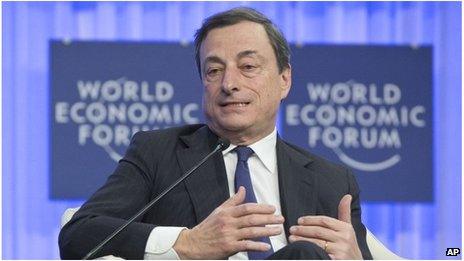Davos 2014: ECB's Draghi sees 'dramatic improvement' in eurozone recovery
- Published

Mario Draghi has previously said he would do whatever it takes to save the euro
The head of the European Central Bank, Mario Draghi, says there has been a "dramatic improvement" in the eurozone recovery over the past two years.
Speaking at a forum in Davos he said: "Risks have decreased across the board both for core eurozone countries and the periphery".
Mr Draghi said that so far the recovery had been driven by exports, but demand was picking up with domestic consumers.
However he warned that the recovery was still fragile and uneven.
On the subject of inflation, Mr Draghi said he was confident that in the medium term the eurozone would achieve its 2% target.
'Underestimated commitment'
Currently, eurozone inflation stands at 0.8% - and there are fears that it could fall further - or even turn negative. That is known as deflation and means prices would actually begin to fall.
Mr Draghi reassured the audience that eurozone policymakers were watching the inflation rate carefully, and he admitted that the "longer this period lasts - the higher the risk" to the recovery.
During his speech, Mr Draghi said he thought the cause of low inflation lies in the fact that the region has been emerging from a banking crisis.
He noted that the inflation rate was not much lower than the rate in the US.
Mr Draghi also said that the European Central Bank (ECB) could not claim all the credit for the eurozone recovery, explaining that the decision by European leaders to create a banking union had played a large part.
"Markets vastly underestimated the amount of political commitment," to a recovery, he said.
European leaders recently agreed to create a common fund that would help the process of closing down a failing bank in the future.
The plan would involve European banks putting 55bn euros ($75bn; £46bn) into a fund over 10 years, to avoid using public money for a bank bailout.